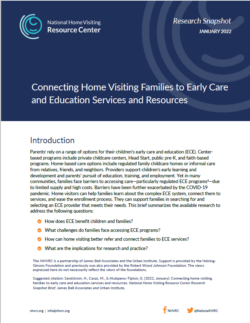
 Parents rely on a range of center- and home-based options for their children’s early care and education (ECE). Providers support children’s early learning and development, and give parents time and space to pursue their own school, work, and training opportunities. Despite these myriad benefits, many families face barriers to accessing care—particularly regulated ECE programs—due to limited supply and high costs. The COVID-19 pandemic has exacerbated such barriers as the ECE field deals with staffing and financial challenges.*
Parents rely on a range of center- and home-based options for their children’s early care and education (ECE). Providers support children’s early learning and development, and give parents time and space to pursue their own school, work, and training opportunities. Despite these myriad benefits, many families face barriers to accessing care—particularly regulated ECE programs—due to limited supply and high costs. The COVID-19 pandemic has exacerbated such barriers as the ECE field deals with staffing and financial challenges.*
Home visitors can help families learn about the complex ECE system, connect them to services, and ease the enrollment process. They can support families in searching for and selecting an ECE provider that meets their needs.
This Research Snapshot Brief summarizes the available research to address the following questions:
- How does ECE benefit children and families?
- What challenges do families face accessing ECE programs?
- How can home visiting better refer and connect families to ECE services?
- What are the implications for research and practice?
Read the full brief to discover four types of resources that can help home visiting programs better support ECE referrals and connections.
*The American Rescue Plan Act of 2021—combined with earlier pandemic relief packages—allocated nearly $50 billion to stabilize the childcare market and expand access to childcare subsidies for families affected by the pandemic. As of press time, U.S. lawmakers had not decided whether to advance proposed legislation that would expand eligibility for the childcare subsidy program to reduce costs for more working families.
Suggested citation: Sandstrom, H., Casas, M., & Atukpawu-Tipton, G. (2022, January). Connecting home visiting families to early care and education services and resources. National Home Visiting Resource Center Research Snapshot Brief. James Bell Associates and Urban Institute.
Acknowledgments: Thank you to Alexandra Joraanstad, Allison Meisch, Jill Filene, and Joelle Ruben at James Bell Associates for their support shaping and refining the brief.